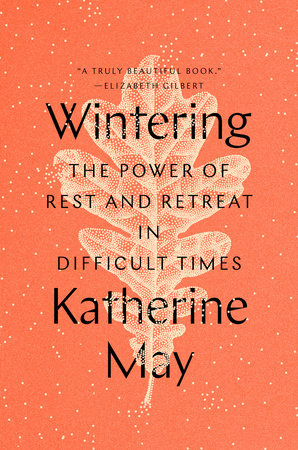
While it is a well-known fact that I adore winter (and loathe temps above 70 degrees), I also recognize that most people do not share my feelings, especially not after the holidays have wound down and we’re looking at several more months of frigid weather. This year in particular, in the middle of a pandemic and in the wake of a bruising election season, a lot of people are feeling…grim, to say the least, at the prospect of a long winter.
Regardless of your affinity for the cold, it’s worth checking out Katherine May’s outstanding new book, Wintering: The Power of Rest and Retreat In Difficult Times. If you’re a fan of winter, the book will affirm the belief that there is beauty to be found in this season, despite — and sometimes because of — the cold and dark. And if you are meant for warmer climes, it has even more to offer: a fresh lens through which you can view this time of year — or any challenging time, really.
Part memoir, part self-help, part topical deep dive, May’s book is about winters both literal and figurative. “Winter” is what she calls difficult periods in her life, when darkness looms and she is tempted to retreat from the world. The one chronicled here fits the bill. In short order, May’s husband fell seriously ill; then she did, and resigned her university teaching position as a result. Soon after, her young son developed school anxiety so profound they eventually chose to homeschool him. She recognized the signs that her personal winter, a time of difficulty and depression, of isolation and struggle, had arrived. Rather than insist everything was fine, or look for a quick fix, however, she took the opposite approach. She chose to accept the coming winter — to treat it as an opportunity for rest and reflection, to turn inward and focus on taking care of herself. She realized that winter, like most other things in life, is cyclical. It would pass eventually – and rather than fruitlessly wish it away, she resolved to learn from it instead.
The book, however, is not just a recounting of her family’s difficulties time. Divided into months, it is an exploration of winter in literature and fairy tales, in cold-weather cultures around the world, in biology, in religious traditions. She attends a solstice celebration at Stonehenge; she begins sea-swimming in February. She resumes knitting and talks to a wolf-tracker. She reflects back on previous winters, including the one when she traveled to Norway to see the Northern Lights, and the one where she literally lost her voice and took singing lessons in order to speak again.
There’s no denial of hard things here. May isn’t proclaiming that winter isn’t cold, or that it’s not THAT dark at 5 o’clock, or that she isn’t ill, or that her child isn’t struggling. She recognizes all of these things. She names them. And then she does what she needs to do — eats well, gets rest, bundles up for her walk, homeschools her child — in order to get through it as best she can. In doing so, she discovers a surprising truth: accepting her winters allows her to see both the difficulties and the beauties of her situation.
Throughout the book, May herself comes across as a tiny bit prickly, but also kind and curious. Her take on winter is thoughtful without being smug, encouraging without being treacly, and most of all, manageable. If you find yourself looking at the next few months with a looming sense of dread or despair, give WINTERING a try — you might find it gives you the tools, and perspective, you need to make it through.

Categories: Books and More
